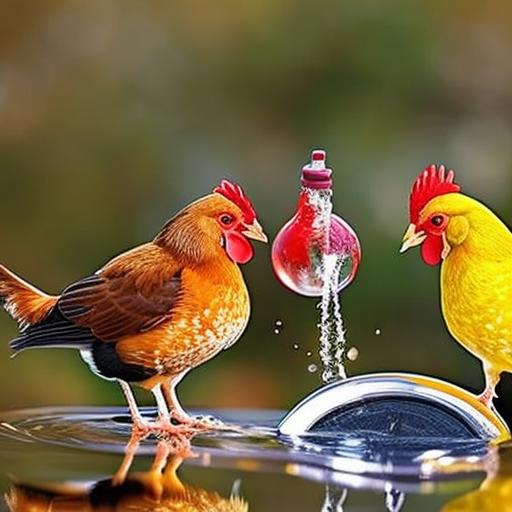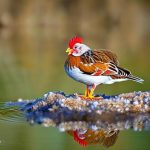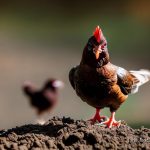Clean water is essential for the health and well-being of chickens. Just like humans, chickens need clean water to stay hydrated and maintain their overall health. Water plays a crucial role in digestion, nutrient absorption, temperature regulation, and waste elimination in chickens. Without access to clean water, chickens can become dehydrated, which can lead to a range of health issues and even death.
Dirty water can pose serious risks to your flock. Bacteria and parasites thrive in dirty water, and when chickens drink contaminated water, they can become sick. Common illnesses that can result from drinking dirty water include bacterial infections, such as salmonella and E. coli, as well as parasitic infections like coccidiosis. These illnesses can cause symptoms such as diarrhea, weight loss, decreased egg production, and even death in severe cases.
Key Takeaways
- Clean water is crucial for the health and well-being of chickens.
- Dirty water can lead to a variety of health risks for chickens, including disease and dehydration.
- Choosing the right watering system and maintaining a regular cleaning schedule are important steps in keeping water clean.
- Implementing a filtration system and using natural additives can further improve water quality.
- Monitoring water quality and providing enough water for your flock are essential for keeping chickens healthy and happy.
Understanding the Risks of Dirty Water for Chickens
Bacteria and parasites can thrive in dirty water, making it a breeding ground for illness and disease in your flock. Chickens are particularly susceptible to bacterial infections like salmonella and E. coli, which can be transmitted through contaminated water sources. These bacteria can cause symptoms such as diarrhea, lethargy, decreased appetite, and even death in severe cases.
Parasitic infections are also a risk when chickens drink dirty water. Coccidiosis is a common parasitic infection that affects the intestinal tract of chickens. It is caused by a protozoan parasite called coccidia, which is commonly found in contaminated water sources. Chickens with coccidiosis may exhibit symptoms such as bloody diarrhea, weight loss, decreased egg production, and general weakness.
To prevent these risks, it is crucial to provide your chickens with clean and fresh water at all times. Regular cleaning of watering equipment and implementing proper filtration systems can help ensure that your flock has access to clean water and reduce the risk of illness and disease.
Choosing the Right Watering System for Your Chicken Coop
When it comes to choosing a watering system for your chicken coop, there are several options to consider. Gravity-fed systems, nipple systems, and cup systems are the most common types of watering systems used for chickens.
Gravity-fed systems rely on gravity to deliver water to the chickens. These systems typically consist of a water container or bucket that is elevated above the ground, with a small opening at the bottom for water to flow into a tray or trough. Gravity-fed systems are easy to set up and maintain, but they can be prone to contamination if not cleaned regularly.
Nipple systems are another popular option for chicken owners. These systems consist of small nipples or valves that release water when chickens peck at them. Nipple systems are more hygienic than gravity-fed systems because they prevent chickens from contaminating the water with their feet or droppings. However, they can be more expensive and require more initial setup.
Cup systems are another option for providing water to chickens. These systems consist of small cups or bowls that are filled with water and placed in the chicken coop. Chickens can drink directly from the cups or bowls. Cup systems are easy to clean and maintain, but they may not be suitable for larger flocks as they have limited capacity.
When choosing a watering system, consider the size of your flock and the ease of cleaning. It is important to choose a system that can accommodate your flock’s water needs and can be easily cleaned to prevent contamination.
Maintaining a Regular Cleaning Schedule for Watering Equipment
Regular cleaning of watering equipment is essential to prevent the buildup of bacteria and other contaminants. Dirty waterers can quickly become breeding grounds for bacteria, algae, and other pathogens that can make your chickens sick.
It is recommended to clean waterers at least once a week, or more often if necessary. Start by emptying and rinsing out the waterer to remove any remaining water and debris. Use a scrub brush or sponge to scrub the inside of the waterer with warm, soapy water. Pay special attention to any hard-to-reach areas or crevices where bacteria may accumulate.
After scrubbing, rinse the waterer thoroughly with clean water to remove any soap residue. Allow the waterer to air dry completely before refilling it with fresh water. Avoid using harsh chemicals or detergents when cleaning waterers, as these can leave behind residues that may be harmful to chickens.
In addition to regular cleaning, it is also important to regularly inspect waterers for signs of damage or wear. Replace any cracked or broken parts to ensure that the waterer functions properly and does not leak or become contaminated.
Implementing a Filtration System to Keep Water Clean
Implementing a filtration system can help remove impurities from your water source and ensure that your chickens have access to clean and safe drinking water. There are several types of filtration systems that you can consider for your chicken coop.
A sediment filter is a common type of filtration system used in chicken coops. It helps remove larger particles, such as dirt, sand, and debris, from the water source. Sediment filters are typically installed at the point where the water enters the coop, such as at the main water line or at the source of the water supply.
Another option is a UV sterilizer, which uses ultraviolet light to kill bacteria, viruses, and other pathogens in the water. UV sterilizers are effective at eliminating harmful microorganisms and can be installed directly in the water line or in the water container itself.
When choosing a filtration system, consider factors such as the size of your flock, the quality of your water source, and your budget. It is important to regularly maintain and replace filters as recommended by the manufacturer to ensure their effectiveness.
Using Natural Additives to Purify and Condition Water

In addition to regular cleaning and filtration, you can also use natural additives to purify and condition the water for your chickens. Natural additives can help kill bacteria, boost immune systems, and improve overall water quality.
Apple cider vinegar is a popular natural additive that can be added to chicken water. It has antimicrobial properties that can help kill bacteria and prevent the growth of algae in water. Apple cider vinegar also contains beneficial enzymes and minerals that can support digestion and boost immune systems in chickens. Add about 1 tablespoon of apple cider vinegar per gallon of water.
Garlic is another natural additive that can be beneficial for chickens. It has antimicrobial properties and can help prevent bacterial infections in chickens. Garlic also contains sulfur compounds that can support respiratory health and boost immune systems. Crush a few cloves of garlic and add them to the chicken’s water source.
Electrolytes and probiotics are also commonly added to chicken water to keep chickens healthy. Electrolytes help replenish essential minerals and nutrients lost during hot weather or periods of stress. Probiotics introduce beneficial bacteria into the chicken’s digestive system, which can improve digestion and overall gut health.
When using natural additives, it is important to follow recommended dosages and guidelines. Too much of certain additives, such as apple cider vinegar or garlic, can be harmful to chickens. Always consult with a veterinarian or poultry expert before adding any additives to your chicken’s water.
Avoiding Common Mistakes That Can Contaminate Chicken Water
There are several common mistakes that chicken owners make that can lead to contaminated water for their flock. By avoiding these mistakes, you can ensure that your chickens have access to clean and safe drinking water.
One common mistake is letting waterers run dry. Chickens need access to clean water at all times, especially during hot weather or periods of high egg production. Make sure to regularly check and refill waterers to prevent them from running dry.
Another mistake is placing waterers in areas where chickens defecate. Chickens naturally defecate in certain areas of their coop or run, and if waterers are placed too close to these areas, they can become contaminated with droppings. Make sure to place waterers in clean and dry areas away from areas where chickens defecate.
It is also important to regularly inspect waterers for clogs or blockages. Nipple systems, in particular, can become clogged with debris or mineral deposits over time. Regularly check and clean the nipples to ensure that water flows freely and does not become contaminated.
Monitoring Water Quality and Identifying Signs of Contamination
Monitoring the quality of your chicken’s water is crucial to ensure that it remains clean and safe for consumption. Regularly inspecting waterers and observing your flock can help you identify signs of contamination or illness.
Look for signs of algae, slime, or discoloration in the water. Algae can grow in water that is exposed to sunlight or has high levels of nutrients. Slime or discoloration can indicate the presence of bacteria or other contaminants. If you notice any of these signs, it is important to clean and disinfect the waterer immediately.
Monitor your flock for signs of illness or decreased water consumption. Sick chickens may exhibit symptoms such as lethargy, decreased appetite, diarrhea, or abnormal behavior. If you notice any changes in your flock’s behavior or health, it is important to consult with a veterinarian or poultry expert to determine the cause and take appropriate action.
Regularly testing the quality of your water source can also provide valuable information about its safety and suitability for your chickens. Water testing kits are available commercially and can help identify any potential contaminants or imbalances in the water.
Providing Enough Water for Your Flock and Preventing Overcrowding
Chickens need access to clean water at all times to stay hydrated and healthy. It is important to provide enough waterers for your flock to ensure that each chicken has access to water.
The general rule of thumb is to provide at least one waterer for every 10 chickens. This ensures that there is enough space for each chicken to drink comfortably and prevents overcrowding around the water source.
Overcrowding can lead to competition for water and may result in some chickens not getting enough water. This can lead to dehydration and other health issues. Make sure to monitor your flock during peak times, such as hot weather or high egg production, and provide additional waterers if necessary.
Prioritizing Clean Water for Healthy and Happy Chickens
Clean water is essential for the health and well-being of your flock. By choosing the right watering system, maintaining a regular cleaning schedule, implementing proper filtration systems, and monitoring water quality, you can ensure that your chickens have access to clean and safe drinking water.
Remember to regularly clean and inspect waterers, avoid common mistakes that can contaminate chicken water, and provide enough water for your flock. By prioritizing clean water, you can help keep your chickens healthy and happy.
If you’re looking for the best way to keep water clean for your chickens, you might want to check out this informative article on Poultry Wizard. They provide valuable insights and tips on maintaining clean water for your feathered friends. From using the Producers Pride Sentinel Chicken Coop to implementing effective chicken coop run plans, they cover all aspects of keeping your chickens’ water supply pristine. To learn more, click here: https://poultrywizard.com/keeping-chickens/producers-pride-sentinel-chicken-coop/.
FAQs
What is the best way to keep water clean for chickens?
The best way to keep water clean for chickens is to provide fresh water daily and clean the waterer regularly.
How often should I change the water for my chickens?
You should change the water for your chickens daily to ensure it is fresh and clean.
What type of waterer is best for chickens?
A gravity-fed waterer or nipple waterer is best for chickens as they keep the water clean and prevent contamination.
How often should I clean the waterer for my chickens?
You should clean the waterer for your chickens at least once a week to prevent the buildup of bacteria and algae.
What should I use to clean the waterer for my chickens?
You can use a mild detergent or vinegar solution to clean the waterer for your chickens. Rinse thoroughly with clean water before refilling.
What are the consequences of not keeping water clean for chickens?
Not keeping water clean for chickens can lead to the spread of diseases, dehydration, and reduced egg production. It can also attract pests and rodents to the coop.
Meet Walter, the feathered-friend fanatic of Florida! Nestled in the sunshine state, Walter struts through life with his feathered companions, clucking his way to happiness. With a coop that’s fancier than a five-star hotel, he’s the Don Juan of the chicken world. When he’s not teaching his hens to do the cha-cha, you’ll find him in a heated debate with his prized rooster, Sir Clucks-a-Lot. Walter’s poultry passion is no yolk; he’s the sunny-side-up guy you never knew you needed in your flock of friends!







